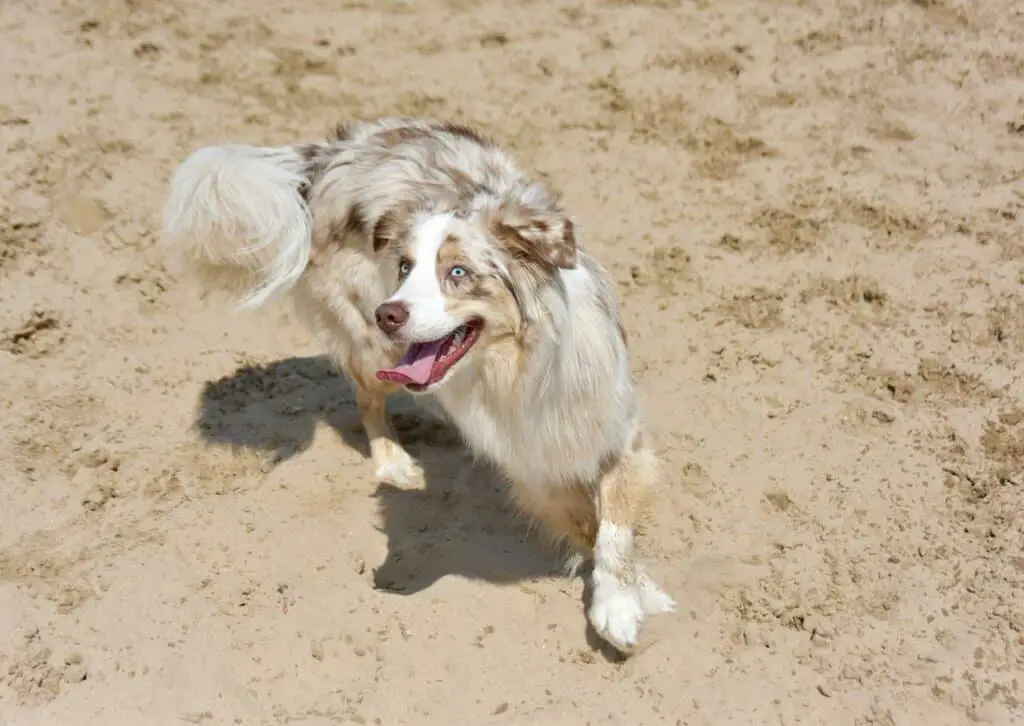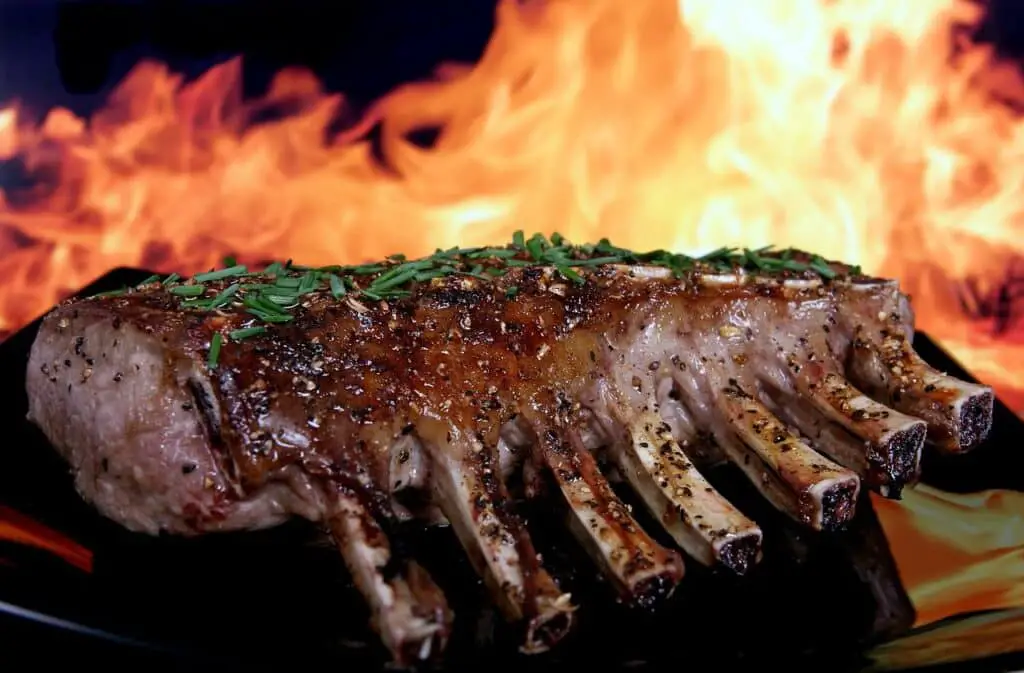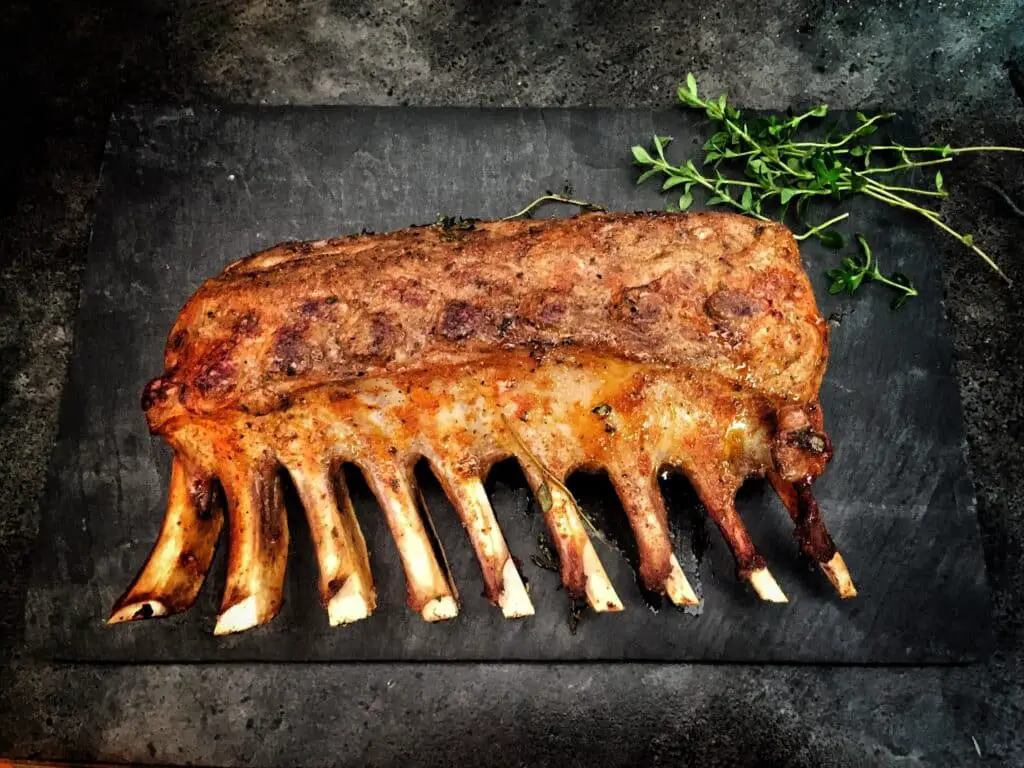Dogs are crazy about bones; they chew on the bark and enjoy just grinding them up.
You’re familiar with the fight over bones if you have two or more dogs.
Unfortunately, some canines tend to gulp things down, and pork rib bones wouldn’t be ideal for them.
So, can dogs have pork rib bones?
Yes and no.
The danger of the bone correlates with dog size, bone size, and whether it’s cooked or raw.
Cooked pork rib bones are fragile and risk choking and intestinal obstruction in small dogs.
On the other hand, since pork rib bones are small, large dogs risk swallowing them whole, leading to choking and gut blockages.
Closely monitor your canine when feeding them any bone type.
Pork rib bones are safe for dogs to consume, but not without some warnings.
This article will guide you on everything about dogs and pork rib bones.

Health benefits of pork rib bones to dogs
Source of minerals
Bones are a good source of minerals for dogs.
However, chewing pork rib bone is riskier than providing adequate nutrients for canines.
It’s difficult for dogs to absorb enough nutrients from a whole bone; therefore, they balance their calcium intake with other mineral sources in the diet.
Otherwise, your dog risks limb deformities and weaknesses due to calcium deficiency.
Dental health
Dogs need to get hard treats and bones occasionally to strengthen their teeth.
These bone chews can minimize the accumulation of tartar in the dog’s teeth, maintaining a hygienic dental space.
However, this doesn’t mean a reduced risk of periodontal disease.
Regularly brush your dogs’ teeth or use dental chews specifically for your pups’ dental health.
Risks of feeding pork rib bones to dogs
Bone splinter damage
Pork rib bones are brittle cooked, or raw; thus, they pose a high risk of splintering.
This would lead to choking, intestinal obstruction, or excessive damage to the gut and intestines.
In addition, pork rib bones are generally small in size, and big dogs might attempt to swallow them whole, which is problematic.
Small breeds can have pork rib bones but under supervision.
Intestinal obstruction
Raw pork rib bones are less likely to splinter; thus, best for your dogs to chew occasionally.
Be cautious since dogs can break them, and the tiny fragments can easily get stuck in the throat, perforating the intestines.
The dog will start coughing or drooling excessively when a bone gets stuck in the throat.
Dental problems
Cooked pork rib bones can easily break and lodge in your dog’s teeth, causing dental problems or even cracking a tooth.
Although a cracked tooth is not life-threatening, it’s painful, and no one wants to see their favorite companion suffering.

What should I do when my dog ingests pork rib bones?
The first action to take when your dog has eaten a pork rib is to call the vet, whether they show signs of distress or not.
Don’t induce vomiting.
Most times, the small pieces will pass without causing harm, but there are occasions when the bones get stuck in your dog’s gut.
If a pork rib bone gets lodged in your dog’s throat, they may show distress signs like excessive drooling, coughing, difficulty breathing, vomiting, excessive licking, and rubbing.
Contact your vet immediately if you note these signs.
Can raw pork rib bones make a dog sick?
Although raw pork ribs are safer than cooked ones in terms of splintering, they pose a risk of bacterial infection.
Raw pork carries the risk of transmitting a bacteria causing trichinosis in pets and humans alike.
This will manifest as vomiting, diarrhea, or lethargy if the meat is contaminated.
Raw pork rib bones can also splinter and cause clogging of the tiny fragments into your dog’s intestines.
You canine will get sick and exhibit symptoms like excess drooling, digestive distress, and difficulty breathing.
Always exercise caution when feeding your dog raw pork ribs.

What if my dog loves chewing on pork rib bones, are there safer alternatives?
There are safer chew toys sturdy enough to handle a long chewing session or break into small pieces that are easily swallowed and digested.
Some chew toys have pork as an ingredient, while others are pork flavored.
So, if your dog is a pork fanatic, this would be the best chewy snack.
Alternatively, you can make a broth from the leftover pork rib bones instead of offering them to your furry friend.
Freeze the broth into popsicles and watch how your dog will enjoy the cold bites.
Large raw beef bones are another safer alternative for dogs.
They are rich in nutrients and minerals and aid with your canine friend’s dental hygiene.
Avoid cooked bones; although large and hard, there’s a risk of splintering, which is unsuitable for your dog.
Frequently asked questions (FAQs)
Can dogs have lamb bones?
Yes, though not every lamb part is safe for dogs.
The best lamb parts to feed your dog are tail bones and ribs.
Raw lamb bines are hard to break and thus perfect as chewing treats.
On the other hand, cooked lamb bones are brittle, and these tiny pieces can badly hurt your dog’s internal organs.
Can dogs eat fish bones?
No, fish bones are dangerous for your dog.
Since they are tiny, dogs can easily swallow them, hurting the throat and intestines.
Cooked or raw, fish bones are a no for dogs.
Can dogs eat smoked pork rib bones?
No, dogs should not have smoked pork rib bones.
Besides their fragile nature, smoked pork rib bones prepared with seasoning harm dogs.
To wrap up
It’s essential to feed your dog a healthy diet and cautiously offer bones as occasional treats.
Pork rib bones can provide them with hours of entertainment, a healthy outlet for playing and chewing, and nutritional addition for them to munch on whenever they’re hungry.
While pork rib bones are not toxic to dogs, they come with complications.
So, now that you have the above knowledge feel free to feed your dog pork rib bones under supervision.
- What Dog Breeds Have Pink Skin? - March 24, 2023
- What Are the Most Inspiring Dog Breeding Quotes? - March 20, 2023
- Can Pheromone Spray Help Improve Dog Breeding Results? - March 19, 2023








